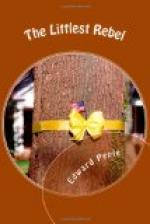And so it happened that on this hot July day the only sign of life on the ’pike was a small cloud of dust which drifted lazily in the wake of two people who passed along the road on foot.
One of the two was a tired, gaunt man in a ragged uniform of gray who stared up the long, hot road ahead of him with eyes in which there was, in spite of every discouragement the light of a certain firm resolve.
The other of the two was a child with bare, brown legs and tattered gingham dress who limped painfully along beside the man, her sunny hair in a tangle half across her pinched and weary little face.
At a faint sigh of exhaustion from the child the man looked down, gathered her up in his arms and perched her on his shoulder. Then he plodded on again, a prey to weariness and hunger. The turning point in Herbert Cary’s life had come. Thanks to a generous enemy; Virgie and he were now reasonably sure of food if once they could reach the Confederate lines but as for himself, with the woman he had loved asleep forever beneath the pines, the future could only be an unending, barren stretch of gray.
Then, almost as quickly, recollection of his duty towards her whom he carried in his arms came to him and he raged at himself for his moment of selfish discouragement. Spurred on by the necessity of gaining a point of safety for his child he began to calculate the distance yet to be covered and their chances of gaining friendly lines before encountering scouting parties of Federals. Behind him, a few miles south on the other bank of the James at Light House Point Sheridan was in camp with two brigades and Cary knew this fast riding, hard striking cavalryman too well not to suspect that the country, even in front of him, was alive with Union men. There was the pass which Morrison had given him, of course, but the worth of a pass in war time often depends more on him who receives it than on the signature.
But all those things, even food, would have to wait for a while because he was consumed with thirst and must find water before he went another mile forward.
A tired sigh from Virgie caught his ear and he stopped by a stone wall and let her get down from his shoulder. The child stood up on the broad, flat stones and then gave a little cry of pain. She raised one foot up and nursed it against her dusty, brown leg, meanwhile clutching her doll closer to her neck.
“It’s all right, honey; be a brave little girl,” her father said consolingly. “There’s a spring along here somewhere and we can look after that poor little foot. Ah, there it is,” he cried, as he caught sight of a big rock behind a stone wall with a seepage of water under it among some trees at one side. “Just sit still a minute—till I rest—and then we’ll have a look.” He leaned back against the wall and closed his eyes to shut out the dizziness with which exhaustion and hunger filled his aching head.
The child watched him anxiously for a moment and then put a soft little hand on his shoulder:




